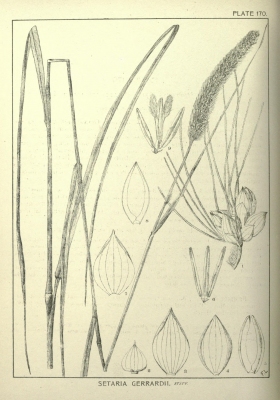Setaria incrassata
(Hochst.) Hack.
Poaceae
Panicum incrassatum Hochst.
Setaria abyssinica Hack.
Setaria albida Stapf
Setaria avettae Pirotta
Setaria bequaertii Robyns
Setaria breviseta Peter
Setaria ciliolata Stapf & C.E.Hubb.
Setaria eylesii Stapf & C.E.Hubb.
Setaria gerrardii Stapf
Setaria holstii R.A.W.Herrm.
Setaria interrupta Peter
Setaria kersteniana Peter
Setaria lacunosa Peter
Setaria lindiensis Pilg.
Setaria longissima Chiov.
Setaria lynesii Stapf & C.E.Hubb.
Setaria merkeri R.A.W.Herrm.
Setaria modesta Stapf
Setaria mombassana R.A.W.Herrm.
Setaria nigrirostris pallida de Wit
Setaria pabularis Stapf
Setaria palustris Stapf
Setaria perberbis Stapf ex de Wit
Setaria phanerococca Stapf
Setaria phleoides Stapf
Setaria phragmitoides Stapf
Setaria plurinervis Stapf
Setaria polyphylla Stapf
Setaria porphyrantha Stapf
Setaria ramulosa Peter
Setaria rudifolia Stapf
Setaria setulosa Stapf
Setaria woodii Hack.
Common Name:
General Information
Setaria incrassata is a clump-forming, perennial grass with short rhizomes, producing culms up to 200cm tall in east Africa, but only to 60cm in west Africa[
332- Title
- The Useful Plants of West Tropical Africa.
- Publication
-
- Author
- Burkil. H. M.
- Publisher
- Royal Botanic Gardens; Kew.
- Year
- 1985 - 2004
- ISBN
-
- Description
- Brief descriptions and details of the uses of over 4,000 plants. A superb, if terse, resource, it is also available electronically on the Web - see http://www.aluka.org/
].
The plant is harvested from the wild for local use in thatching, basketry etc. It is sometimes grown in soil stabilization projects.
Known Hazards
None known
Botanical References
500- Title
- Flora of Somalia
- Publication
-
- Author
- Thulin M. (Editor)
- Publisher
- Kew Publishing, London.
- Year
- 1993
- ISBN
-
- Description
- Detailed information on the plants of the region, often adding notes on the plants uses.
Range
Tropical Africa - Nigeria to Ethiopia and Somalia, south through eastern Africa and southern Africa to northern S. Africa.
Habitat
Found in a variety of habitats from savannah to stony hillsides and margins of evergreen forest; from lowlands to upland situations, most commonly on heavy clay soils[
332- Title
- The Useful Plants of West Tropical Africa.
- Publication
-
- Author
- Burkil. H. M.
- Publisher
- Royal Botanic Gardens; Kew.
- Year
- 1985 - 2004
- ISBN
-
- Description
- Brief descriptions and details of the uses of over 4,000 plants. A superb, if terse, resource, it is also available electronically on the Web - see http://www.aluka.org/
].
Properties
| Other Uses Rating |      |
| Habit | Perennial |
| Height | 1.00 m |
| Pollinators | Wind |
| Cultivation Status | Cultivated, Wild |
Cultivation Details
A plant of the tropics, where it is found at elevations up to 2,400 metres. It grows best in areas where annual daytime temperatures are within the range 16 - 30°c, but can tolerate 12 - 36°c[
]. When dormant, the plant can survive temperatures down to about -3°c, but young growth can be severely damaged at -1°c[
]. It prefers a mean annual rainfall in the range 700 - 1,200mm, but tolerates 500 - 1,300mm[
].
Succeeds in full sun and in light shade[
]. Grows best in a fertile soil[
]. Succeeds in a wide range of soils[
]. Prefers a pH in the range 6.5 - 7.5, tolerating 6.2 - 8.2[
].
Edible Uses
None known
Medicinal
None known
Agroforestry Uses:
Sown for erosion control on black earths. The plant's speed and reliability of establishment make it ideal for short-term leys[
].
Other Uses
The culms are used in hut-building and to make rope. They are generally used for thatching and for basket-making[
332- Title
- The Useful Plants of West Tropical Africa.
- Publication
-
- Author
- Burkil. H. M.
- Publisher
- Royal Botanic Gardens; Kew.
- Year
- 1985 - 2004
- ISBN
-
- Description
- Brief descriptions and details of the uses of over 4,000 plants. A superb, if terse, resource, it is also available electronically on the Web - see http://www.aluka.org/
].
Propagation
Seed -
If you have any useful information about this plant, please leave a comment. Comments have to be approved before they are shown here.


 Useful Tropical Plants Database 2014 by
Ken Fern,
web interface by
Ajna Fern
with help from
Richard Morris.
Useful Tropical Plants Database 2014 by
Ken Fern,
web interface by
Ajna Fern
with help from
Richard Morris.